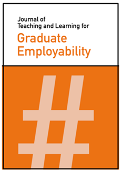From passion to profession: an employability framework in sport development
DOI:
https://doi.org/10.21153/jtlge2023vol14no1art1762Abstract
Employers seek graduates with a broad skill set who can acquire and implement new skills to quickly adapt to changes in the workplace. To ensure graduates are well-equipped for the workforce, universities should prioritise not just delivery of discipline-specific coursework, but also provision of opportunities for students to cultivate their employability skills. Tailored employability initiatives across the lifecycle of a degree are presented in this paper. By examining a case study in Sport Development, the article showcases how structured employability curriculum can be effectively integrated into core subjects to provide students with the essential abilities and understanding required for graduate employment. This paper demonstrates that universities have the potential to further strengthen students’ employability skills by incorporating customised employability initiatives throughout the student lifecycle, encompassing both curricular and co-curricular activities. Universities are encouraged to work closely with alumni, industry, and other stakeholders to develop a degree-wide approach to employability activities that are tailored to the needs of students and their future profession.
References
Ajjawi, R., Tai, J., Huu Nghia, T. L., Boud, D., Johnson, L., & Patrick, C. J. (2020). Aligning assessment with the needs of work-integrated learning: The challenges of authentic assessment in a complex context. Assessment & Evaluation in Higher Education, 45(2), 304-316. https://doi.org/10.1080/02602938.2019.1639613
Bates, G. W., Rixon, A., Carbone, A., & Pilgrim, C. (2019). Beyond employability skills: Developing professional purpose. Journal of Teaching and Learning for Graduate Employability, 10(1), 7-26. https://doi.org/10.21153/jtlge2019vol10no1art794
Bates, L., & Hayes, H. (2017). Using the Student Lifecycle Approach to Enhance Employability: An Example from Criminology and Criminal Justice. Asia-Pacific Journal of Cooperative Education, 18(2), 141-151. https://files.eric.ed.gov/fulltext/EJ1151139.pdf
Bennett, D. (2021). Fostering equitable access to employability development through an institution-wide, in-curricular strategy. In M. Shah, S. Kift, L. Thomas (Eds). Student Retention and Success in Higher Education: Institutional Change for the 21st Century, (pp 191-215). Palgrave Macmillan. https://doi.org/10.1007/978-3-030-80045-1_10
Bridgstock, R. (2009). The graduate attributes we’ve overlooked: Enhancing graduate employability through career management skills. Higher Education Research & Development, 28(1), 31-44. https://doi.org/10.1080/07294360802444347
Bridgstock, R. (2011). Skills for creative industries graduate success. Education + Training, 53(1), 9-26. https://doi.org/10.1108/00400911111102333
Bridgstock, R., Grant-Iramu, M., & McAlpine, A. (2019). Integrating career development learning into the curriculum: Collaboration with the careers service for employability. Journal of Teaching and Learning for Graduate Employability, 10(1), 56-72. https://doi.org/10.21153/jtlge2019vol10no1art785
Bridgstock, R., & Hearn, G. (2012). A conceptual model of capability learning for the twenty-first-century knowledge economy. In D. Rooney, G. Hearn, & T. Kastelle (Eds.), Handbook on the knowledge economy, Volume two (pp. 105-120). Edward Elgar Publishing. https://doi.org/10.4337/9781781005132.00015
Bridgstock, R., & Jackson, D. (2019). Strategic institutional approaches to graduate employability: Navigating meanings, measurements and what really matters. Journal of Higher Education Policy and Management, 41(5), 468-484. https://doi.org/10.1080/1360080x.2019.1646378
Daubney, K. (2022). “Teaching employability is not my job!”: redefining embedded employability from within the higher education curriculum. Higher Education, Skills and Work-Based Learning, 12(1), 92-106. https://doi.org/10.1108/heswbl-07-2020-0165
Dean, B. A., Ryan, S., Glover-Chambers, T., West, C., Eady, M. J., Yanamandram, V., Moroney, T. & O'Donnell, N. (2022). Career development learning in the curriculum: What is an academic's role? Journal of Teaching and Learning for Graduate Employability, 13(1), 142-154. https://doi.org/10.21153/jtlge2022vol13no1art1539
Doll, J. L. (2018). Structured interviews: Developing interviewing skills in human resource management courses. Management Teaching Review, 3(1), 46-61. https://doi.org/10.1177/2379298117722520
Gore, S., Kadish, S., & Aseltine Jr, R. H. (2003). Career centered high school education and post–high school career adaptation. American Journal of Community Psychology, 32(1-2), 77-88. https://doi.org/10.1023/a:1025646907466
Griffith University. (2015). The Griffith Employability and Career Success Framework. Careers and Employment Service. https://www.griffith.edu.au/careers-employment/staff/griffith-employability-framework
Harris-Reeves, B., Pearson, A., & Massa, H. (2022). Exploring the expectations and experiences of first year students undergoing a tailored transition initiative. Journal of University Teaching & Learning Practice, 19(3). https://doi.org/10.53761/1.19.3.16
Kumar, A. (2007). Personal, academic and career development in higher education: SOARing to success. Routledge. https://doi.org/10.4324/9780203938348
Lizzio, A. (2011). The student lifecycle: An integrative framework for guiding practice. Griffith University.
Lizzio, A., & Wilson, K. (2013). Early intervention to support the academic recovery of first-year students at risk of non-continuation. Innovations in Education and Teaching International, 50(2), 109-120. https://doi.org/10.1080/14703297.2012.760867
McBurnie, J. E., Campbell, M., & West, J. (2012). Avoiding the second year slump: A transition framework for students progressing through university. International Journal of Innovation in Science and Mathematics Education, 20(2), 14-24. https://openjournals.library.sydney.edu.au/CAL/article/view/5801
Østergaard, S. F., & Nordlund, A. G. (2019, December 20). The 4 biggest challenges to our higher education model – and what to do about them. World Economic Forum. https://www.weforum.org/agenda/2019/12/fourth-industrial-revolution-higher-education-challenges/
Patrick, C. J., Peach, D., Pocknee, C., Webb, F., Fletcher, M., & Pretto, G. (2008). The WIL (Work Integrated Learning) report: A national scoping study. Queensland University of Technology. https://eprints.qut.edu.au/216185/1/WIL-Report-grants-project-jan09.pdf
Pedler, M. L., Willis, R., & Nieuwoudt, J. E. (2022). A sense of belonging at university: Student retention, motivation and enjoyment. Journal of Further and Higher Education, 46(3), 397-408. https://doi.org/10.1080/0309877X.2021.1955844
Pitan, O. S., & Muller, C. (2023). Assessment of Strategies for Preparing Graduates for the Disruptive Workplace: Evidence from Nigeria and South Africa. Journal of Teaching and Learning for Graduate Employability, 14(1), 15-30. https://doi.org/10.21153/jtlge2023vol14no1art1576
Tomasson Goodwin, J., Goh, J., Verkoeyen, S., & Lithgow, K. (2019). Can students be taught to articulate employability skills?. Education + Training, 61(4), 445-460. https://doi.org/10.1108/et-08-2018-0186
Wilson, K., Lizzio, A., Buys, N., Cowley, K., Lindsay, K., Allison, K., & Vervoort, S. (2011). Facilitating commencing students’ success with early assessment. Australian Learning and Teaching Council.
Downloads
Published
Issue
Section
License
Copyright (c) 2023 Brooke Harris-Reeves

This work is licensed under a Creative Commons Attribution-NonCommercial 4.0 International License.












